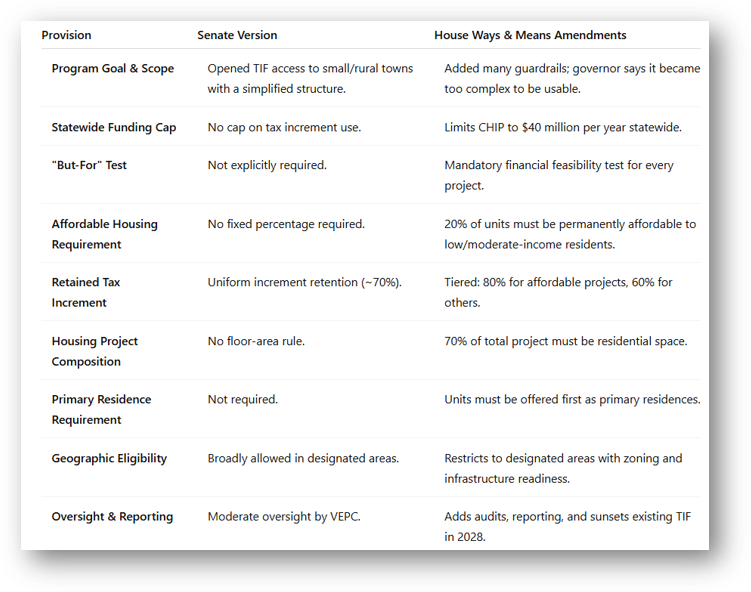Death by a 1,000 Cuts: Ways and Means Committee Tries to Kill Housing Bill
The Vermont Ways and Means Committee has issued a "strike-all" amendment to kill a proven way to finance more housing in Vermont.
A sweeping housing bill designed to help Vermont's small towns fund infrastructure for new homes is facing criticism after the House Committee on Ways and Means added layers of restrictions that Governor Phil Scott says could make it nearly impossible for rural communities to participate.
Senate Bill S.127 originally aimed to expand access to tax increment financing (TIF) through a new program called the Community and Housing Infrastructure Program, or CHIP. The goal: allow small towns to borrow against future property tax growth to build water, sewer, and road systems that support housing development. But House lawmakers say they were concerned about the financial risk to the state's Education Fund and added what they call "reasonable guardrails."
Governor Scott disagrees. In a recent statement, he warned that the changes would make it "harder and almost impossible" for small towns with limited staff and resources to take advantage of the program. “The CHIP program, as originally designed, would have helped towns across the state, from Readsboro to Richford,” Scott said. “But the House version is too complicated, adds too many restrictions, and risks sidelining the very communities it was supposed to help.”
Comparing the Senate and House Versions of CHIP
Below is a comparison of key provisions in the original Senate version of S.127 and the amended version passed by the House Ways and Means Committee:
Why It Matters for Small Towns
Under the House's version, CHIP includes new administrative hurdles and eligibility criteria that may be difficult for small towns to meet:
Affordability Mandates: Small-town developments often involve small-scale builders without the financing to include 20% affordable units. That may disqualify otherwise viable projects.
"But-For" Test: Each application must prove that the development wouldn't happen without CHIP, a financial analysis many towns lack the expertise or budget to prepare.
Location Limits: Towns without zoning or designated growth centers could be left out altogether.
Funding Cap: Once the $40 million limit is reached, no more projects can be approved that year, putting smaller towns at a disadvantage against faster-moving urban counterparts.
Governor and Housing Advocates Push Back
Governor Scott and housing advocates argue that the new restrictions defeat the bill's original purpose. "We should be making it easier for rural communities with limited resources to revitalize their economies," Scott said.
Housing advocates warn that the complexity will deter participation, particularly from towns with part-time staff and volunteer planning commissions. Senator Kesha Ram Hinsdale echoed those concerns, noting that too many guardrails could "keep people out of being able to participate."
With Vermont in the midst of a housing crisis and rural areas struggling to attract new residents, the outcome of this debate could have long-lasting consequences. Lawmakers must now decide whether CHIP will become a practical tool for revitalization or remain out of reach for the communities that need it most.



